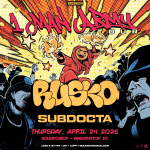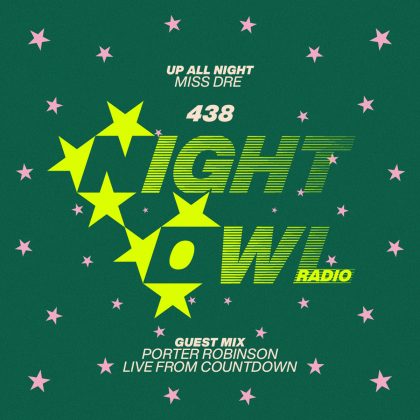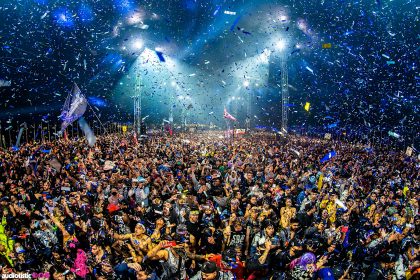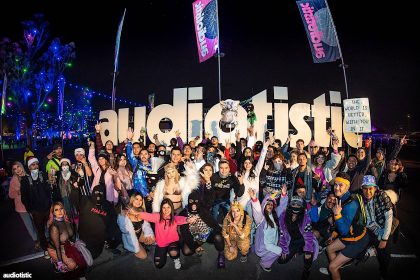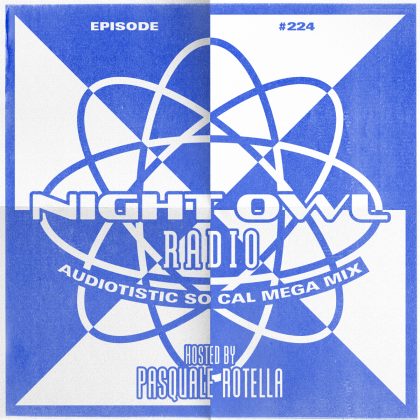6 Artists You Didn’t Know Played Audiotistic
Upcoming Event
The first thing you’ll notice about the upcoming Audiotistic SoCal 2018 is the wide range of sounds repped on the lineup. From big names like Porter Robinson to colossal rappers like Lil Uzi Vert, Audiotistic is blurring genres lines like it ain’t no thang. But that’s just par for the course.
Audiotistic SoCal 2018 tickets are on sale now.
Originally launched in Los Angeles in 1996 as a strictly electronic underground event, Audiotistic holds a rich history defined by sonic experimentalism and a commitment to the sounds of tomorrow. In fact, Audiotistic was officially billed as the “future sound festival” back in the day. As one of the first true multi-genre festivals, it remained ahead of the cultural curve via its boundary-pushing lineups, which featured top artists in hip-hop, dubstep, electronica, drum & bass, breaks, electro, and beyond. The same could be said today of Audiotistic’s forward-thinking soundtracks, which fuse the best of the best from the worlds of hip-hop, dubstep, and dance music.
In many ways, Audiotistic’s trendsetting approach predicted the current-day dominance of hip-hop and dance music across pop culture. And in many ways, it helped evolve and progress that industry trend. What remains true throughout the decades is Audiotistic’s passion for the next big sounds and tomorrow’s future stars. It’s what Audiotistic has been doing since day one.
Ahead of Audiotistic SoCal 2018, which takes place Saturday, December 29, at NOS Events Center in San Bernardino, CA, we revisited some of the groundbreaking lineups from way back when and gathered the biggest, baddest, and most WTF performances and artists from the past.
QBert
San Francisco–born DJ QBert is a hip-hop OG and turntablism purist. A member of the pivotal breakdancing and hip-hop group Rock Steady Crew, QBert is widely considered one of the most influential scratch DJs and a pioneer of DJ culture. He’s a founding member of Invisibl Skratch Piklz, a crew of DJs that’s credited as the first to approach turntablism as a band, creating songs out of layers of drums, tracks, basslines, and scratch solos. QBert’s approach to scratching and mixing helped elevate DJ culture to an art form and has directly influenced modern-day DJ wizards like A-Trak, Craze, and Z-Trip.
QBert, who performed at the third installment of Audiotistic in 1998, was the first to introduce hip-hop to the festival. “It wasn’t even a rapper or a live act—it was a DJ,” says Meelo Solis, the original founder of Audiotistic and Insomniac’s current VP of festivals and concerts. “QBert lived in his own world… in the hip-hop world via his scratching, hip-hop records, and sampling. People went fucking crazy.” QBert’s influence on Audiotistic is still evident today.
OutKast
OutKast were reaching their peak levels of fame by the time they headlined Audiotistic in April 2002. Still riding high off the global breakout success of Stankonia, their 2000 hip-hop masterpiece, the Southern rap duo, composed of rappers André 3000 and Big Boi, notched two Grammy wins in 2002 for the album: Best Rap Album and Best Rap Performance by a Duo or Group for the global hit “Ms. Jackson.” (Stankonia was also nominated for Album of the Year but ultimately lost to the O Brother, Where Art Thou? soundtrack.)
That same year, hip-hop became the main focus and the biggest draw at Audiotistic. In addition to OutKast as headliners, the lineup featured live acts and rappers like the Roots, Mos Def, Talib Kweli, and Blackalicious. “OutKast brought a full band and a whole choreographed team of dancers, and André 3000 was dressed all crazy,” Solis remembers. “They just came out with so much energy and such a good vibe. It was pretty impressive and memorable.” OutKast member Big Boi would return to Audiotistic as one of the headlining acts in 2003.
Kanye West
This one is a bit of a cheat, so bear with us. In 2002, Brooklyn rapper Talib Kweli released his debut album Quality, which featured his biggest hit to date, “Get By,” produced by Kanye West. The song marked the early stages of Kweli’s and West’s working relationship and friendship, with the former bringing the latter on tour in the early 2000s. (Kanye would later beautifully reminisce on these halcyon days on “Last Call,” the reflective closing track off his 2004 debut album, The College Dropout.
Fast-forward to 2003, and Talib Kweli is one of the main acts at Audiotistic. During his set, he brought out West for a surprise performance, which became one of his earliest festival appearances, right before Kanye West became Kanye West. It went down as “one of those you-had-to-be-there moments,” says Solis.
De La Soul
A year after QBert introduced hip-hop to Audiotistic (see above), NY trio and golden-age hip-hop pioneers De La Soul in 1999 became the first live rap act to perform at the festival. That year—and De La Soul’s booking in particular—were pivotal for the event. “That Audiotistic went viral,” remembers Solis, “even though we didn’t use that term back then.”
For their part, De La Soul delivered an impressive set that pulled from the group’s early discography, which was four albums deep by 1999, including cuts off their breakthrough 1989 debut album, 3 Feet High and Rising. “[It was the] right time, right place for De La Soul,” Solis says. “Their classics touched the dance music world a lot, and they had some newer material at that time that was buzzing.”
Bassnectar and Rusko
By the beginning of this decade, electronic music had become the fastest-growing genre in the world, especially in the States. In particular, dubstep started gaining major traction in the US by 2010, following the explosion of Skrillex’s seminal Scary Monsters and Nice Sprites EP. Audiotistic rode the dubstep wave that same year by securing two of the genre’s most buzzing acts from both sides of the pond: American artist Bassnectar, who was then rocking beats from his 2009 album Cozza Frenzy, and UK producer Rusko, who was melting heads with his 2010 debut album O.M.G.!
Booking Bassnectar and Rusko, who performed separately at the festival, became a major moment for both bass music and Audiotistic. In fact, the buzz was so high, both artists were eventually bumped from the side bass stage to the mainstage. “We were for sure the first festival in L.A. to put bass music on the mainstage,” says Solis, “and definitely one of the first in the country to do so.”
Porter Robinson
At the beginning of this decade, before Porter Robinson was making the beautiful, cinematic soundscapes that have come to define his alternative electronic pop style of today, he was dropping nasty complextro and dubstep tracks (peep his aggressive 2010 track “Say My Name” for a quick primer). That is all to say the Porter Robinson who performed at Audiotistic in 2011 was much different from the one we know and love today. His hard-hitting set at Audiotistic traversed all sorts of genres—including progressive house, trance, electro house, and more—and became one of his breakout performances. “It was Porter Robinson’s first mainstage performance for Insomniac,” remembers Solis. “He’d played only small stages [for us] before.” Following a performance under his newly launched Virtual Self project at Audiotistic Bay Area this past summer, Robinson makes a full circle as the headlining act for Audiotistic SoCal 2018 this month.
Audiotistic SoCal 2018 takes place Saturday, December 29, at NOS Events Center in San Bernardino, CA. Tickets are on sale now. For more information, visit the official website.
Follow Audiotistic on Facebook | Twitter | Instagram

